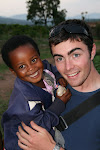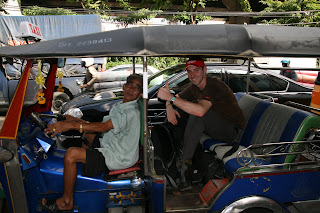We have arrived safely in Rwanda, the town of Butansinda. It is a small hamlet really, a round sloping field surrounded by mudbrick square buildings not much larger than a single garage, about 200 m off the main road.
People walk everywhere, wandering about in the afternoon sun passing the days news and talking in small groups. This is a heavily populated country - 8 million people in an area the size of Southeast Queensland living on subsistence farming. Every square inch of land is utilised, be it for cultivation, for goats to forage, or for stands of eucalyptus under which locals collect the daily firewood.
We are staying in a school house belonging to an expat Australian who is the Director of ETO Gitarama - Rwanda 5 star with both a toilet AND electricity. Our meals are prepared for us by Japhet, who is hired to do the cooking and the washing. He has a priviliged life by Rwandan standards - and is a very kind and helpful person.
We are considered extremely rich here as the average wage is around $60 a month. For many, hunger is a daily preoccupation and meat is a luxury. The school soccer final was played yesterday, with the Electronics house winning a goat to eat for dinner - the only meat they have had for some time. With such a lot riding on the game it isn't surprising the competition was fierce, and the spectators on the cliff edge bopping along to the music provided by a loudspeaker wired in to a cassette deck were numerous.
This week was spent conducting First Aid Courses for students of 4th and 5th years - the 6th year students (final year of high school) are too busy preparing for exams in a week's time. The students who attended were very attentive and asked many questions prefaced with the line: "How can you save someone who has..." followed by increasingly gruesome injuries. For many, they will never make it to hospital because they cannot afford the 15 minute bus fare (where a bus is a Toyota Hiace with 15-20 people crammed inside). To pay for hospitalisation is beyond the means of the majority. As we soon found out, the way the question is put is not simply a quaint turn of phrase - it is a harsh reality: how can you save someone who is injured when you have nothing at hand and no access to medical care? It seems First Aid is more often than not the only aid for anything from snake bites to broken bones.

So we taught them CPR for electrocution and drowning, how to stop blood flow and how to manage shock. Whether or not this will ever be of any use, I am not sure. But at least it has increased the general knowledge of the population a little.
Yesterday I received a small list from the students who were members of the Red Cross (aka those who were charged with looking after injured people). They need everything from rubbing alcohol, bandages and dressings to stretchers, water containers and gloves. There is nothing here - and clothes are not really looked upon as disposable for dressings.
And yet what is most interesting is the pride in which people take to dress up - shoes are always immaculate, houses impeccably swept, clothes neatly arranged and well looked after. To see people out and about belies the poverty of this country, but scratch the surface and it becomes immediately apparent.
Anyhow, a little bit more later on!


